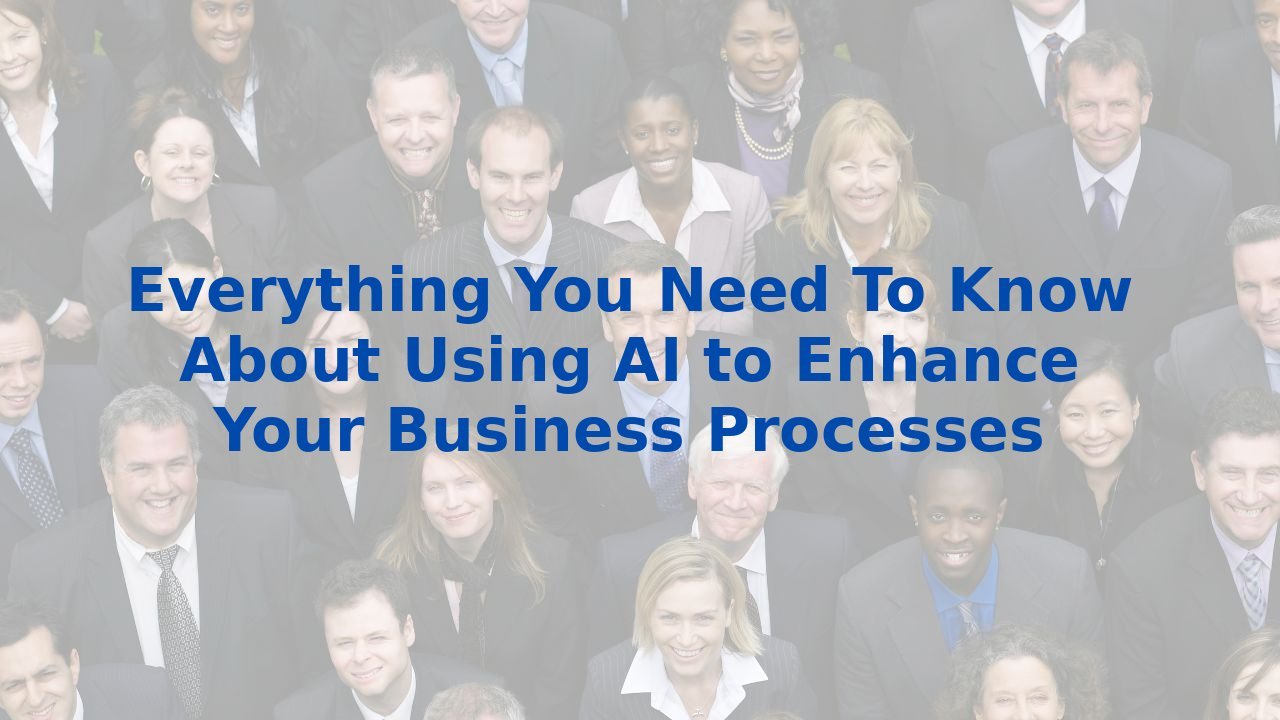Everything You Need To Know About Using AI to Enhance Your Business Processes
Everything You Need To Know About Using AI to Enhance Your Business Processes
In an era where time is money, businesses are relentlessly searching for ways to enhance efficiency and effectiveness. Enter Artificial Intelligence (AI)—a game changer that not only streamlines operations but fundamentally transforms how organizations operate. From automating processes to enabling better decision-making, AI is the backbone of modern business transformation.
1. Process Discovery and Mapping
Understanding your business processes is crucial for optimizing them. AI excels in this arena through process discovery and mapping. By leveraging machine learning algorithms and sophisticated data analytics, AI tools can analyze vast amounts of operational data. This analysis uncovers inefficiencies and bottlenecks that may elude traditional methods. The result? A clear visual representation of processes that highlights areas for improvement and allows for informed, data-driven decisions.
2. Process Automation
One of the most remarkable applications of AI is in process automation. Robotic Process Automation (RPA) powered by AI is capable of taking on repetitive, rule-based tasks that previously consumed valuable human resources. Imagine a scenario where mundane data entry or customer service inquiries are handled seamlessly by AI systems. This automation not only boosts efficiency but empowers employees to focus on more strategic, high-impact activities that propel the organization forward.
3. Real-Time Monitoring and Optimization
AI offers the capability for real-time monitoring of business processes, providing organizations with up-to-date status information. This immediacy is crucial; it allows businesses to intervene promptly when issues arise and seize opportunities as they present themselves. Beyond monitoring, AI goes a step further by predicting potential issues, enabling proactive measures that maintain fluid operations and prevent bottlenecks.
4. Decision Support and Predictive Analytics
In today's complex business landscape, making informed decisions is paramount. AI enhances decision-making by providing thorough insights, simulating scenarios, and suggesting optimal choices. With the ability to analyze both structured and unstructured data from various sources, AI reveals patterns and trends that inform strategic decisions. This capability enables organizations to understand potential risks, evaluate outcomes, and navigate uncertainties with confidence.
5. Continuous Improvement
AI doesn't just enhance processes— it cultivates a culture of continuous improvement. By providing ongoing feedback and data-driven recommendations, organizations can iteratively refine their processes. This commitment to sustained enhancement drives long-term success, ensuring that business strategies align with evolving industry standards and objectives.
Benefits of AI in Business Processes
- Improved Efficiency: AI automates routine tasks, reducing errors and minimizing the need for manual intervention.
- Enhanced Decision Making: AI reveals trends and supports better decision-making through predictive recommendations.
- Real-Time Monitoring: The real-time capabilities of AI empower companies to act decisively to solve problems.
- Process Optimization: AI identifies inefficiencies, enabling organizations to drive sustainable improvements in operations.
Training Employees for AI
While the technological benefits of AI are immense, it is critical for organizations to invest in training their workforce to utilize these advancements effectively. Without proper training, even the most advanced AI tools may underperform, leading to lost opportunities.
Understanding AI Tools
It’s vital for employees to grasp how these AI-driven applications function. Training programs that cover the basics of machine learning, data input, and result interpretation will empower employees to leverage AI’s full potential.
Data Management
Employees must also be well-versed in managing and maintaining the data that feeds AI systems. Quality data is the lifeblood of AI effectiveness; ensuring that data is up-to-date and relevant is paramount for realizing its benefits.
Collaboration with AI
Ultimately, fostering a collaborative environment between AI systems and human intelligence is key to elevating performance. Training should orient employees to recognize which tasks can be automated and when human judgment is indispensable. This symbiosis of human and machine will unlock new avenues for organizational success.
Conclusion
To wrap it all up, AI is not merely a tool; it’s a transformative force capable of redefining business processes. From enhancing efficiency to supporting better decision-making, the benefits of AI are vast. However, these advancements need to be combined with effective employee training to harness their full potential. By embracing AI and investing in their workforce, organizations can not only keep pace with the rapid evolution of the business landscape but also thrive amidst the competition.
For those looking to dive deeper into the world of AI, consider exploring training options to equip your team with essential AI skills. Check out Complete AI Training for more insights and resources to help your organization stay ahead.



